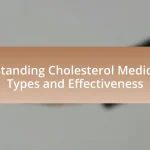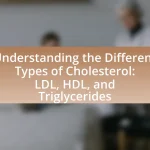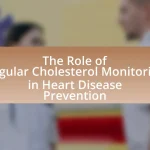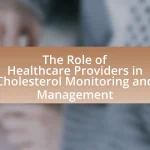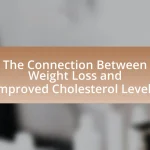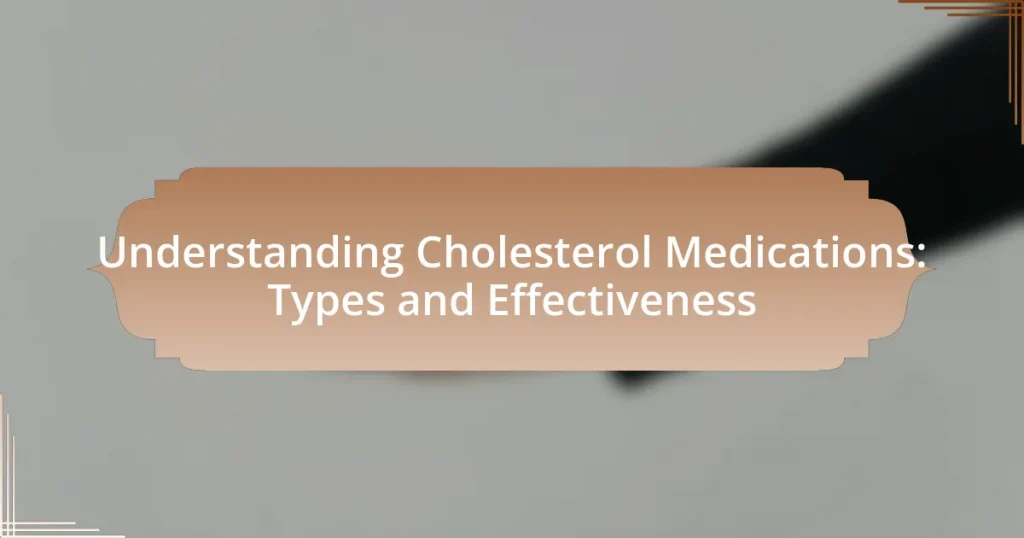Cholesterol medications are pharmaceutical agents aimed at lowering cholesterol levels in the blood to mitigate the risk of cardiovascular diseases. This article provides an overview of various types of cholesterol medications, including statins, bile acid sequestrants, and PCSK9 inhibitors, detailing their mechanisms of action, effectiveness, and the conditions they aim to prevent or treat. It also discusses the factors influencing the effectiveness of these medications, the importance of adherence to treatment, and the lifestyle changes that can enhance their efficacy. Additionally, the article highlights the long-term outcomes associated with cholesterol medication use and best practices for optimizing treatment.
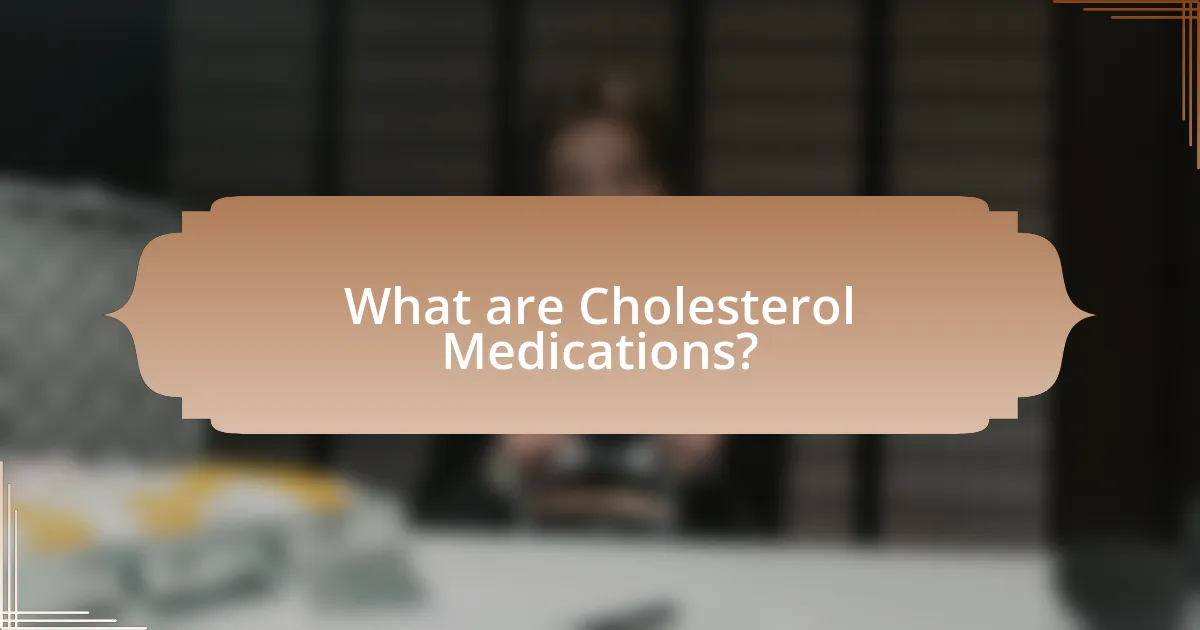
What are Cholesterol Medications?
Cholesterol medications are drugs designed to lower cholesterol levels in the blood, primarily to reduce the risk of cardiovascular diseases. These medications include statins, which inhibit cholesterol production in the liver, and other classes such as bile acid sequestrants, niacin, and PCSK9 inhibitors, each targeting cholesterol management through different mechanisms. Statins, for example, have been shown to reduce the risk of heart attack and stroke by lowering low-density lipoprotein (LDL) cholesterol, which is often referred to as “bad” cholesterol. According to the American Heart Association, statins can lower LDL cholesterol by 20% to 60%, significantly impacting cardiovascular health.
How do Cholesterol Medications work in the body?
Cholesterol medications primarily work by lowering the levels of cholesterol in the bloodstream, which helps reduce the risk of cardiovascular diseases. Statins, a common class of cholesterol medications, inhibit the enzyme HMG-CoA reductase, which plays a crucial role in cholesterol synthesis in the liver, leading to decreased cholesterol production and increased uptake of LDL cholesterol from the blood. Other types, such as bile acid sequestrants, bind bile acids in the intestine, prompting the liver to use more cholesterol to produce new bile acids, thus lowering blood cholesterol levels. Additionally, PCSK9 inhibitors enhance the liver’s ability to remove LDL cholesterol from the blood by inhibiting the PCSK9 protein, which normally degrades LDL receptors. These mechanisms collectively contribute to the effectiveness of cholesterol medications in managing cholesterol levels and reducing the risk of heart disease.
What are the primary mechanisms of action for these medications?
The primary mechanisms of action for cholesterol medications include the inhibition of cholesterol synthesis, increased clearance of LDL cholesterol, and modulation of lipid metabolism. Statins, for example, inhibit HMG-CoA reductase, the enzyme responsible for cholesterol production in the liver, leading to reduced levels of LDL cholesterol in the bloodstream. Bile acid sequestrants bind bile acids in the intestine, preventing their reabsorption and promoting the conversion of cholesterol to bile acids, which lowers LDL levels. Additionally, PCSK9 inhibitors enhance the liver’s ability to remove LDL cholesterol from the blood by inhibiting the PCSK9 protein, which normally degrades LDL receptors. These mechanisms collectively contribute to the effectiveness of cholesterol medications in managing hyperlipidemia and reducing cardiovascular risk.
How do Cholesterol Medications affect lipid levels?
Cholesterol medications primarily lower lipid levels by targeting specific pathways in lipid metabolism. Statins, for example, inhibit the enzyme HMG-CoA reductase, which reduces cholesterol synthesis in the liver, leading to decreased levels of low-density lipoprotein (LDL) cholesterol. Clinical studies show that statins can lower LDL cholesterol by 20% to 60%, depending on the dosage and specific medication used. Other classes of cholesterol medications, such as fibrates and niacin, also effectively lower triglycerides and can raise high-density lipoprotein (HDL) cholesterol. For instance, fibrates can reduce triglyceride levels by 30% to 50%. These medications collectively contribute to improved lipid profiles and reduced cardiovascular risk.
Why are Cholesterol Medications prescribed?
Cholesterol medications are prescribed primarily to lower levels of low-density lipoprotein (LDL) cholesterol in the blood, which is associated with an increased risk of cardiovascular diseases. These medications, such as statins, work by inhibiting the enzyme HMG-CoA reductase, which plays a central role in cholesterol production in the liver. Clinical studies, including a meta-analysis published in the Journal of the American College of Cardiology, have shown that statin therapy can reduce the risk of heart attacks and strokes by approximately 25-30% in high-risk populations. Thus, the prescription of cholesterol medications is a critical intervention for managing cholesterol levels and reducing cardiovascular risk.
What conditions do Cholesterol Medications aim to prevent or treat?
Cholesterol medications aim to prevent or treat cardiovascular diseases, including heart attacks and strokes. These medications, such as statins, work by lowering levels of low-density lipoprotein (LDL) cholesterol, which is a significant risk factor for atherosclerosis, a condition that narrows and hardens arteries. According to the American Heart Association, high LDL cholesterol is linked to an increased risk of coronary artery disease, which can lead to heart attacks. Additionally, cholesterol medications may also help manage conditions like familial hypercholesterolemia, a genetic disorder characterized by extremely high cholesterol levels.
How do healthcare providers determine the need for Cholesterol Medications?
Healthcare providers determine the need for cholesterol medications primarily through assessing a patient’s lipid profile, which includes total cholesterol, LDL (low-density lipoprotein), HDL (high-density lipoprotein), and triglycerides. They also consider risk factors such as age, family history of heart disease, presence of diabetes, hypertension, and lifestyle factors like diet and exercise. Clinical guidelines, such as those from the American College of Cardiology and the American Heart Association, recommend specific thresholds for initiating treatment based on these factors. For example, individuals with an LDL level of 190 mg/dL or higher are generally advised to start statin therapy, as this level is associated with a significantly increased risk of cardiovascular events.
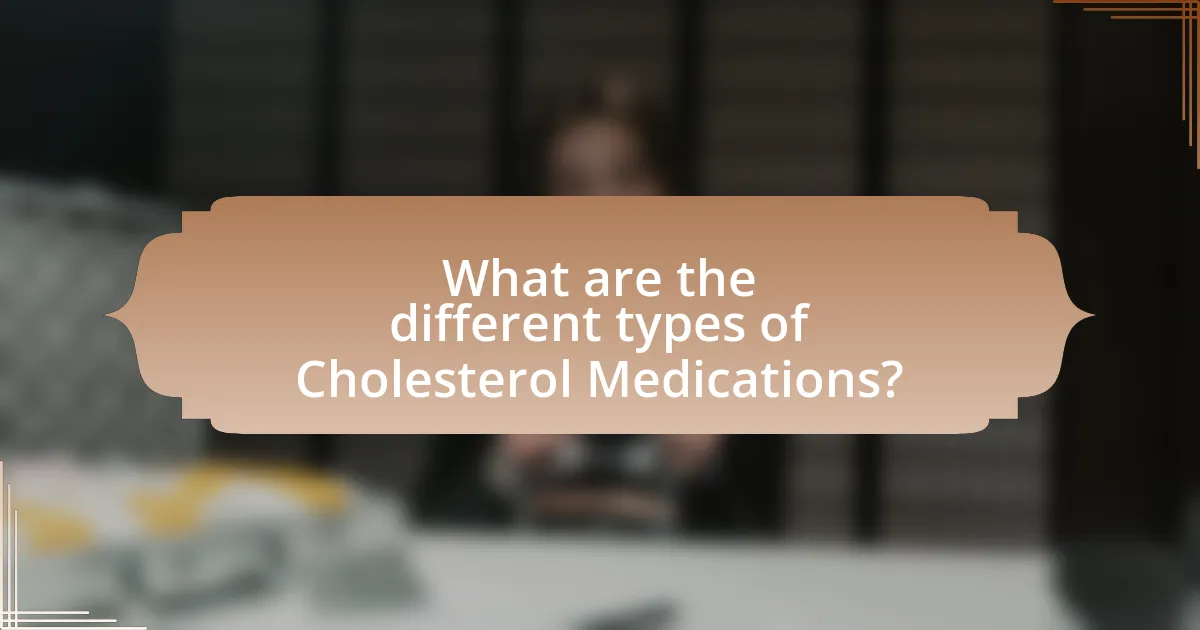
What are the different types of Cholesterol Medications?
The different types of cholesterol medications include statins, bile acid sequestrants, cholesterol absorption inhibitors, fibrates, and PCSK9 inhibitors. Statins, such as atorvastatin and simvastatin, work by inhibiting the enzyme HMG-CoA reductase, which plays a central role in cholesterol production in the liver. Bile acid sequestrants, like cholestyramine, bind bile acids in the intestine, leading to increased cholesterol conversion to bile acids. Cholesterol absorption inhibitors, such as ezetimibe, reduce the absorption of dietary cholesterol in the intestines. Fibrates, including fenofibrate, primarily lower triglyceride levels and can modestly increase HDL cholesterol. Lastly, PCSK9 inhibitors, like alirocumab, are monoclonal antibodies that enhance the liver’s ability to remove LDL cholesterol from the bloodstream. These medications are prescribed based on individual cholesterol levels and cardiovascular risk factors.
What are Statins and how do they work?
Statins are a class of medications used to lower cholesterol levels in the blood. They work by inhibiting the enzyme HMG-CoA reductase, which plays a central role in the production of cholesterol in the liver. By blocking this enzyme, statins effectively reduce the synthesis of cholesterol, leading to decreased levels of low-density lipoprotein (LDL) cholesterol, often referred to as “bad” cholesterol. Clinical studies have shown that statins can lower LDL cholesterol levels by 20% to 60%, significantly reducing the risk of cardiovascular diseases such as heart attacks and strokes.
What are the common Statins available on the market?
Common statins available on the market include atorvastatin, simvastatin, rosuvastatin, pravastatin, and lovastatin. These medications are widely prescribed to lower cholesterol levels and reduce the risk of cardiovascular diseases. Atorvastatin, for example, is one of the most commonly used statins, known for its effectiveness in lowering low-density lipoprotein (LDL) cholesterol. According to the American Heart Association, statins are proven to significantly reduce the risk of heart attacks and strokes in individuals with high cholesterol levels.
What are the potential side effects of Statins?
Statins can cause several potential side effects, including muscle pain, liver damage, digestive problems, and increased blood sugar levels. Muscle pain, known as myopathy, occurs in approximately 5-10% of patients taking statins, while serious muscle damage, or rhabdomyolysis, is rare but can occur in about 0.1% of users. Liver damage may manifest as elevated liver enzymes, which is typically reversible upon discontinuation of the medication. Digestive issues such as nausea, diarrhea, and constipation are also reported, affecting around 10-15% of users. Additionally, statins may lead to a slight increase in blood sugar levels, potentially raising the risk of developing type 2 diabetes in some individuals.
What are Non-Statin Cholesterol Medications?
Non-statin cholesterol medications are a class of drugs used to lower cholesterol levels in individuals who cannot tolerate statins or require additional cholesterol management. These medications include bile acid sequestrants, cholesterol absorption inhibitors, and PCSK9 inhibitors, each working through different mechanisms to reduce low-density lipoprotein (LDL) cholesterol. For instance, bile acid sequestrants bind to bile acids in the intestine, preventing their reabsorption, while PCSK9 inhibitors enhance the liver’s ability to remove LDL cholesterol from the bloodstream. Studies have shown that these non-statin options can effectively lower LDL cholesterol levels, providing alternative treatment pathways for patients with hyperlipidemia.
What are the different classes of Non-Statin medications?
The different classes of Non-Statin medications include bile acid sequestrants, cholesterol absorption inhibitors, fibrates, and PCSK9 inhibitors. Bile acid sequestrants, such as cholestyramine, work by binding bile acids in the intestine, leading to increased cholesterol excretion. Cholesterol absorption inhibitors, like ezetimibe, reduce the absorption of dietary cholesterol in the intestines. Fibrates, including fenofibrate, primarily lower triglyceride levels and can modestly increase HDL cholesterol. PCSK9 inhibitors, such as alirocumab and evolocumab, are monoclonal antibodies that enhance the liver’s ability to remove LDL cholesterol from the bloodstream. Each class has distinct mechanisms of action and can be used in various clinical scenarios to manage cholesterol levels effectively.
How do Non-Statin medications compare to Statins in effectiveness?
Non-statin medications generally have a different mechanism of action and may be less effective than statins in lowering LDL cholesterol levels. Statins, such as atorvastatin and simvastatin, have been shown to reduce LDL cholesterol by 20-60% and significantly lower the risk of cardiovascular events, as evidenced by large-scale studies like the JUPITER trial, which demonstrated a 44% reduction in heart attack and stroke risk among statin users. In contrast, non-statin options like ezetimibe and PCSK9 inhibitors can lower LDL cholesterol but often do so to a lesser extent; for example, ezetimibe typically reduces LDL by about 15-20%. PCSK9 inhibitors can achieve greater reductions, sometimes exceeding 50%, but they are often used in conjunction with statins for optimal effectiveness. Therefore, while non-statin medications can be beneficial, statins remain the first-line treatment for managing high cholesterol due to their proven efficacy in reducing cardiovascular risk.
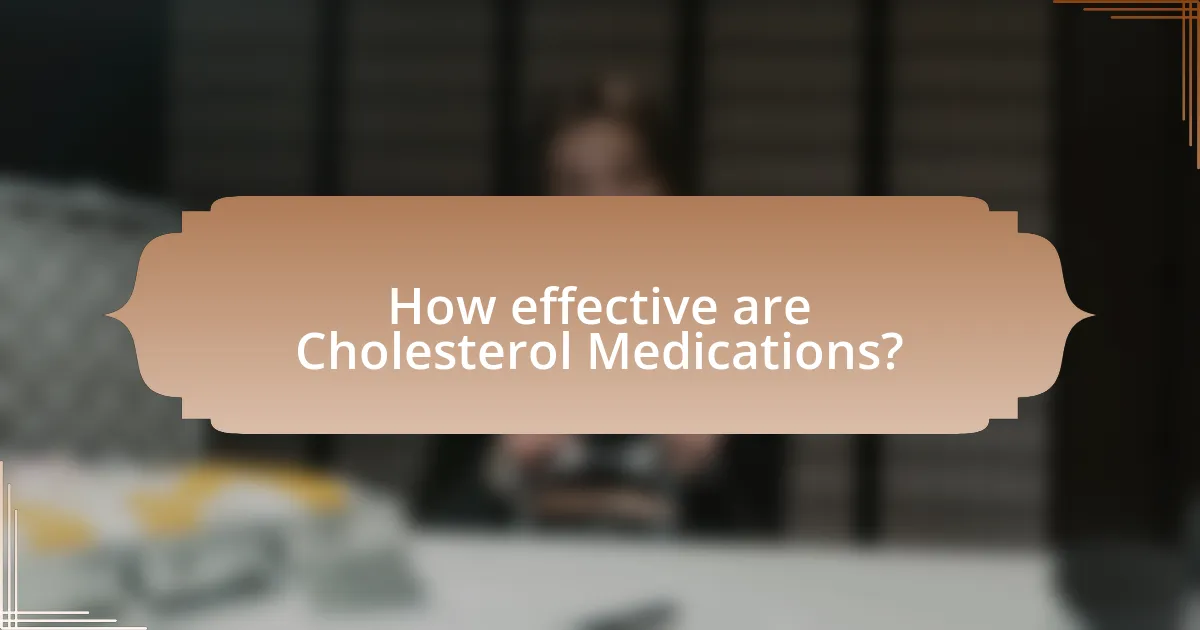
How effective are Cholesterol Medications?
Cholesterol medications are highly effective in lowering LDL cholesterol levels and reducing the risk of cardiovascular events. Statins, the most commonly prescribed cholesterol-lowering drugs, can reduce LDL cholesterol by 20% to 60%, depending on the specific medication and dosage. Clinical studies, such as the Scandinavian Simvastatin Survival Study, have demonstrated that statin therapy significantly decreases the incidence of heart attacks and strokes in high-risk populations. Additionally, other classes of cholesterol medications, like PCSK9 inhibitors, have shown to further lower LDL levels and provide additional cardiovascular protection.
What factors influence the effectiveness of Cholesterol Medications?
The effectiveness of cholesterol medications is influenced by several factors, including the type of medication, patient adherence to the prescribed regimen, individual metabolic differences, dietary habits, and the presence of other medical conditions. Statins, for example, are widely used and have been shown to reduce LDL cholesterol levels significantly; however, their effectiveness can vary based on genetic factors that affect drug metabolism, such as variations in the SLCO1B1 gene, which can lead to increased side effects and reduced adherence. Additionally, lifestyle factors like diet and exercise play a crucial role; studies indicate that a heart-healthy diet can enhance the cholesterol-lowering effects of medications. Furthermore, comorbidities such as diabetes or hypothyroidism can also impact how well cholesterol medications work, as these conditions may alter lipid metabolism.
How do individual health conditions affect medication response?
Individual health conditions significantly influence medication response by altering drug metabolism, efficacy, and safety profiles. For instance, patients with liver disease may experience reduced drug clearance, leading to increased drug levels and potential toxicity. Similarly, individuals with kidney impairment may have altered excretion rates, affecting the duration and intensity of medication effects. Research indicates that genetic factors, such as polymorphisms in drug-metabolizing enzymes, can also modify responses to medications, impacting therapeutic outcomes. These variations underscore the necessity for personalized medicine approaches to optimize treatment efficacy and minimize adverse effects in patients with diverse health conditions.
What role does adherence to medication play in effectiveness?
Adherence to medication is crucial for the effectiveness of cholesterol treatments. When patients consistently take their prescribed cholesterol medications, they are more likely to achieve desired lipid levels, which reduces the risk of cardiovascular events. Studies indicate that adherence rates of 80% or higher can lead to significant reductions in LDL cholesterol levels, thereby improving overall health outcomes. For instance, a meta-analysis published in the Journal of the American College of Cardiology found that improved adherence to statin therapy was associated with a 25% reduction in the risk of heart attacks and strokes. This evidence underscores the importance of medication adherence in maximizing the therapeutic benefits of cholesterol-lowering drugs.
What are the long-term outcomes of using Cholesterol Medications?
Long-term outcomes of using cholesterol medications, particularly statins, include a significant reduction in cardiovascular events such as heart attacks and strokes. Studies indicate that statin therapy can lower LDL cholesterol levels by 30-50%, which correlates with a 20-30% reduction in the risk of major cardiovascular events over a period of 5 years or more. Additionally, long-term use of these medications has been associated with improved overall survival rates in high-risk populations, as evidenced by the results from the Cholesterol Treatment Trialists’ Collaboration, which analyzed data from multiple trials involving over 170,000 participants. However, some patients may experience side effects, including muscle pain and increased liver enzymes, which can impact adherence to treatment.
How do Cholesterol Medications impact cardiovascular health over time?
Cholesterol medications, particularly statins, significantly improve cardiovascular health over time by lowering LDL cholesterol levels and reducing the risk of heart disease. Statins have been shown to decrease the incidence of major cardiovascular events, such as heart attacks and strokes, by approximately 25-30% in high-risk populations, according to a meta-analysis published in the Journal of the American College of Cardiology. Additionally, long-term use of these medications can lead to plaque stabilization in arteries, further enhancing cardiovascular outcomes.
What studies support the long-term use of these medications?
The studies supporting the long-term use of cholesterol medications, particularly statins, include the “West of Scotland Coronary Prevention Study” (WOSCOPS), which demonstrated a significant reduction in cardiovascular events over a five-year period among men with high cholesterol. Additionally, the “Heart Protection Study” (HPS) showed that long-term statin therapy reduced the risk of major vascular events in a diverse population over a five-year follow-up. Furthermore, the “JUPITER trial” indicated that rosuvastatin significantly lowered the incidence of cardiovascular events in individuals with elevated high-sensitivity C-reactive protein levels, supporting long-term use for primary prevention. These studies collectively provide robust evidence for the efficacy and safety of long-term cholesterol medication use in reducing cardiovascular risk.
What are the best practices for using Cholesterol Medications?
The best practices for using cholesterol medications include adhering to prescribed dosages, maintaining regular follow-up appointments with healthcare providers, and incorporating lifestyle changes such as a heart-healthy diet and regular exercise. Adhering to prescribed dosages ensures optimal effectiveness; for instance, statins, commonly prescribed for lowering cholesterol, have been shown to reduce cardiovascular events by 30-40% when taken as directed. Regular follow-ups allow healthcare providers to monitor cholesterol levels and adjust medications as necessary, ensuring that patients achieve their target lipid levels. Additionally, lifestyle changes complement medication efficacy; studies indicate that a diet low in saturated fats and high in fruits, vegetables, and whole grains can further lower cholesterol levels and enhance overall heart health.
How can patients optimize their treatment with Cholesterol Medications?
Patients can optimize their treatment with cholesterol medications by adhering strictly to prescribed dosages, maintaining a heart-healthy diet, and engaging in regular physical activity. Following the prescribed dosage ensures that the medication effectively lowers cholesterol levels, as studies show that adherence can lead to a 30-50% reduction in LDL cholesterol. A heart-healthy diet, rich in fruits, vegetables, whole grains, and healthy fats, complements medication by further lowering cholesterol levels and improving overall cardiovascular health. Regular physical activity, recommended at least 150 minutes per week, can enhance the effectiveness of cholesterol medications by improving lipid profiles and promoting weight management.
What lifestyle changes should accompany Cholesterol Medication use?
Lifestyle changes that should accompany cholesterol medication use include adopting a heart-healthy diet, increasing physical activity, maintaining a healthy weight, quitting smoking, and managing stress. A heart-healthy diet emphasizes fruits, vegetables, whole grains, lean proteins, and healthy fats while reducing saturated fats, trans fats, and cholesterol intake. Regular physical activity, such as 150 minutes of moderate exercise per week, can help lower LDL cholesterol levels and improve overall heart health. Maintaining a healthy weight is crucial, as losing even a small percentage of body weight can positively impact cholesterol levels. Quitting smoking improves cardiovascular health and can enhance the effectiveness of cholesterol medications. Lastly, managing stress through techniques like mindfulness or yoga can contribute to better heart health. These lifestyle changes are supported by research indicating that they can significantly enhance the effectiveness of cholesterol medications and reduce cardiovascular risk.
